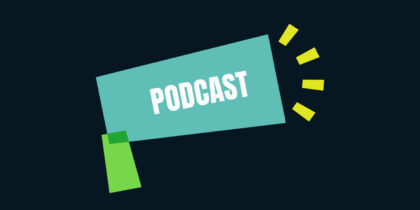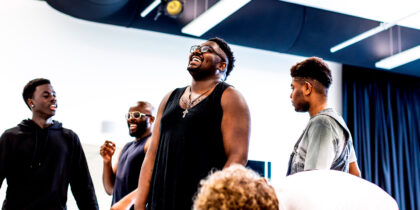Thea sits down with Chris Frederick, an expert by experience who has been charting a unique course in his work on suicide prevention. Chris’s experience of poor mental health led him to set up Project Soul Stride, through which he is collecting people’s stories and building knowledge around Black mental health and suicidality. With this evidence, he’s been challenging systems and services to improve mental health support and suicide prevention to better meet the needs of Black people.
If you appreciated this episode, we’d love your support to keep our work going – please donate today: www.centreformentalhealth.org.uk/donate
Listen to the episode on Spotify or Apple Podcasts. The full transcript is available below.
Show notes
- Find out more about Project Soul Stride
- Read Frank Keating’s 2002 report, Breaking the circles of fear
- Read Chris Frederick’s blog on Black mental health and suicidality
Alethea Joshi (AJ): Hello and welcome to Centre for Mental Health’s podcast. Centre for Mental Health challenges policies, systems and society so that everyone can have better mental health. I’m Thea Joshi, and each episode, I speak with our guests about mental health and social justice. Today I chatted to Chris Frederick, Chris is an expert by experience who works with other organisations to support better mental health for Black communities. We talked about his own experience of mental health problems – and the lack of representation of Black people in mental health research and services. Chris shared how all this drove him to set up Project Soul Stride, which aims to address racial inequalities in mental health services. Just to flag that our conversation does mention suicide, so if that feels difficult, please feel free to step away. Hope you enjoy. So welcome Chris to the Centre for Mental Health podcast.
Chris Frederick (CF): Good afternoon. How are you?
AJ: I’m well. I’m well, and I’m so happy that you can join us. I’m really excited to sit down and hear from you for an hour about all the different work that you’re doing. So thank you for joining us today.
CF: Most welcome.
AJ: So Chris, you are a lived experience practitioner, and actually, you have described yourself as a mental health Jedi, so I’m really interested to know a little bit more about yourself and what you do.
CF: So you know, it’s, it’s interesting with all these acronyms that sort of float around the sector, LXP, PPI, EBE, which I really love, expert by experience, only because I love Extraterrestrial Biological Entity reference on the X file. So, you know, it’s I found myself in this work only maybe just over a year ago, threw myself into it. It’s become a passion for myself. I was looking for something to do, a purpose, and I believe I’ve found it now through the work of Project Soul Stride, you know, working with teams like yourself and other organizations, large and small. And, yeah, really proud of the achievements that I’ve done so far this year.
AJ: That is wonderful, and I’m really excited to dig in and hear more about it and the work with Project souls, right? And, and I know that you are a big Star Wars fan, hence the mental health Jedi reference. So I feel like I must ask you who your favorite Star Wars character is.
CF: Well it’s got to be, it’s got to be Darth Vader, Lord Vader. Only because one, obviously the voice, James L Jones, who we lost just last week, or early this week, which is such a such a shame, and it’s a really quick but funny story. So I was previously on the LinkedIn Star Wars fans group for about two, three years, and it was quite big. Actually had about 8, 10,000 people. So I messaged the chap who ran it out of Italy, and I said, Oh, you know, could I co host this group for you? Because I felt like we could do so much more. And he never got back to me. And about a week later, I found that I was kicked off the group, and I realized that the owner had also lost his LinkedIn account. So within the same evening, I restarted the Star Wars fan group myself. So I literally, I jumped in because I thought there was a space there in the market, so I literally grabbed it. It’s one of those opportunities for me to escape the work that I do on, you know, suicide and mental health.
AJ: I love it. So you’ve alluded, obviously, to the to the work that you do around suicide and mental health and using your lived experience. And I wondered if you would be willing to tell us a little bit about your own journey around mental health and mental ill health.
CF: Yeah, no, absolutely. I mean, I guess the tipping point sort of came in late summer of 2018 when I sort of just finished my tour of duty in Singapore. I’d been living there for about 15 years, and I’d reached rock bottom. I’d lost my job. I was at, you know, I was at wit’s end. I really didn’t know what to do. I was in I was up to my neck in debt. I was on my own, really lonely, really isolated, and I thought the solution at the time was to, you know, try and take my life. So I attempted suicide then, and that basically was the beginning of what’s now been a long term recovery journey. I eventually left Asia after nearly 20 years, went to Los Angeles, got some treatment, then came back to UK before Covid, and attempted suicide for the second time during Covid in April of 2021 and that was the last time, and I believe it will be the last time, I think it was the moment I looked up from my hospital bed at Ealing hospital, and I looked into the face of my mother, and she knew I was in trouble, but she didn’t realize quite how much. And I realized that this couldn’t continue, right? I needed to seek help. And she was there, family members were there, friends rallied around, and I was basically put into the system, you know, and just to see what would happen, I wasn’t sure whether I’d be taken care of. I was virtually an unknown in the country. I was like a, I guess, like a new immigrant coming into the UK, because I’ve been away for nearly 20 years. I didn’t even know what my NHS number was. So I was literally starting from a clean slate. But, you know, thank God, you know the services came to my aid and much, much to celebrate, some things didn’t go well, but many things did go well, and that’s why I’m able to share this story with you now, because I’m still here and I’m still alive.
AJ: That’s amazing. And yeah, thank you for sharing that, because I know it’s really not easy to share those kind of things. And we’re grateful to you for kind of being open about your own experience. And you’ve obviously, as you mentioned, gone on to set up Project Soul Stride. And I’d love to know kind of what drove you to do that, and also then, what Project Soul Stride set out to do. Where did it come from?
CF: Absolutely, one morning I woke up. It was August 16 ’23 I woke up. One morning I said, I felt like, Thea, I felt like I was at risk again of dropping back into some old patterns, I really felt, I was in between therapy, and I was beginning to lose a little bit of faith. And so I sat at my desk and I reflected, and I read back through all of my journals and all of the therapy notes that I had taken, and I realized I needed a project. I needed something just to get me out of bed in the morning, give me some purpose. And I figured, let me do something for three months. Let’s just see what happens. And so I wrote down on a sheet of paper the key things I wanted to accomplish. And you know, basically, let’s put a voice to the name. Let me try and use my 30 years of private sector commercial skills to communicate my story, to find out what other people felt. And I put all of this into Chat GPT and I asked the question, because that was, I live in a room. So often I see Chat GPT as the only person I can often talk to, and I wish it did have the James Earl Jones voice, because that would just be perfect, right? Yes, imagine or Samuel L Jackson or Denzel Washington’s voice. But on serious note, I put it in there, and I said, I want to do this project. And it gave me some really encouraging feedback. And I said, Okay, I want to give it a name. I want to give it a name that would speak to soul, Black people, music, the young, the older generation, give me some options. And it gave me about six. And I sat there and I stared into the screen, and I saw this Project Soul Stride, and it just jumped out to me. So I wrote it down, and I thought, I’m going to use that, even if it’s just for three months and I’ll never use it again. And then I started to work on the positioning and the content and even early thinking about the logo. And as I started to sort of socialize it with people, both friends and allies and acquaintances, people were like Chris, this has got a really catchy name to it, and I think you should just run with it. So I was like, okay, and that’s what I did.
And I’d set out to interview 30 people via Zoom, Teams, Google, pull them down from my LinkedIn network, people that I felt had a voice, had a stake in this issue around, you know, Black mental health and a lack of, you know, appropriate services. And I started to interview them in an unstructured way, because I’m not a trained academic. I was not using any standard format. And I got through the first 30 and then something quite extraordinary happened, and it was actually Andy Bell who told me that there is an academic term that’s called the snowball effect. And actually, I began to see these 30 names snowball into 60 names, into 90 names, until eventually it became more like a tsunami or like an avalanche. And as of this month, I would have interviewed just over 175 people in the in the space of 14 months.
And as somebody who’s trained in interviewing, having spent 30 years in recruitment and talent and sales, marketing, business development, that’s the stuff that I love. I love talking to people, interviewing, sharing stories, building relationships, that’s the really fun stuff, and that’s why people have just, ‘Chris, I know this person, they’re going to want to talk to you’, or ‘this person’s a photographer, this person’s an editor of a newspaper, I think they’re going to want to talk to you’. And so I just said, yeah, send them my way, and without having any real end goal in mind, these calls have turned into some really interesting insights, and it was the turning point came in December, Thea, it was Professor Kamlesh Bhui from Oxford University, and he said to me, Chris, what you’ve done is so is so unusual, it’s so innovative, that even though some people might call it a study, a research study, that could result in a white paper, you’ve actually not followed any of the standard structures that we do in academia. So his suggestion was, why don’t you treat this exercise, this project, as if you were an investigative journalist, and call it a independent review of the Black mental health and suicide prevention marketplace conducted by an expert by experience, and when he positioned it to me like that, I was like, that means then that I’m not shackled by any restrictions. I can slice and dice all the content and insights that I get, and I can repackage it through social media so that it gets to the people who actually need to listen, read and hear, yeah, from a Black man’s perspective, actually, what’s going on. And then once I made that switch in my brain, it was like the chariot was off and running. There was no stopping me.
AJ: That’s so interesting to hear. And I think it really sort of also challenges notions about what we count as evidence, and how, we tell our stories and how we share experiences, doesn’t it? And I guess I’m just interested to know, did you have certain experiences that kind of led you to think ‘this is needed. We need to tell these stories’?
CF: 100%. When I started sort of the really hard work of dealing with my mental illness, I wanted to learn about the subject, not just for my own recovery, but I actually wanted to learn about it. I also wanted to learn about suicide. And so I became a student of both subjects, and that meant attending hours and hours of webinars and reading white papers, and, you know, watching YouTube videos from other speakers and experts in the field. And I came to one very obvious understanding,- very obviously, it was dominated by the white community. I reflected on so many meetings that I had attended, I would often be the only Black face, and I was happy to just sit and listen and be a bystander because I was there to learn, but feeling marginalized and not necessarily being asked from my perspective and my insights from my angle, I realized that that really was not acceptable, and so when I also read, which you would know well Thea, the great paper by Professor Frank Keating, which came out in ’02 through you guys, in your previous incarnation, Breaking the Circles of Fear. I’ve read that paper now so many times and I had to ask myself in 2023 how much has changed in 21 years based on my own experiences? And I came to the overwhelming conclusion, really not much has changed. And so I felt okay, maybe there is an opportunity here to try and make a difference. And that was one of the criteria that I put into Chat GPT to say, just how important do you think this work could be? And it said, this work is essential Chris.
AJ: Yeah, yeah, and you’re totally right. And we hosted an event 20 years on from that. So what, gosh, I can’t believe that’s already been two years ago, with Frank Keating and others looking exactly at that and just saying, so little has changed, and obviously now we’ve got encouraging movement in terms of things like the Patient and Carer Race Equality Framework, but the reality is, you know, we had new Mental Health Act statistics out a few weeks ago, and the statistics are the same. There is still this galling, stark disparity in terms of the detention of Black people versus white people, the experiences of health care that Black people receive, the kind of more coercive styles of treatment, like, we cannot look away from these things. So I think it’s just, of course it’s essential what you’re doing. I wholeheartedly concur with Chat GPT, and I’m so glad that you’re doing it. You were telling us about the work that you’ve been doing and the hundreds of interviews, and what were the key aims of doing that?
CF: You know, as I’ve gone through the last 14 months, so many ideas and ambitions are sort of come to mind, but I think I’ve now settled on what I believe are the three key areas. And what I must say is that I stand on the shoulders of giants that have come before me. I won’t name them now, but I know who they are. I’ve spoken to them and they themselves, have said to me, Chris, we’ve attempted, we’ve done what you’re doing now, but we stopped either because it got too hard or we just didn’t see enough change. So we switched gear, we changed direction. So what you’re doing now is great, keep going, look after yourself. Here are some possible pitfalls, but, and I kept that in the back of my mind, because I realized that I’m just one, sort of, if you could imagine from the Olympics, the relay race, the four by 100, I’m just another runner in the race that somebody has passed me the baton. I’m now taking it on.
What I want to do, objective number one, is I’d like to find and identify other younger Black men who are feeling as marginalized as I did, who are feeling as passionate as I am about this subject, and I’d like to work with them, mentor them and coach them to become the next generation of Black mental health advocates. And that would be a really great legacy for me to leave behind, because I’m 54 now, I can’t imagine I’m going to be wanting to do this much beyond the age of 60 to be honest with you, I think I’ll be pretty much burnt out by then. I’ll never know just how many people I’m helping. If it’s one, it was worth it. If it’s 100 it’s still worth it, right? I’m just glad I was able to find help, and I have to be able to use my experiences so people don’t go through what I went through. So number one is build an advocacy platform with stories, with creative aspects, video, colors, things that speak to the Black community. Pass on that button. Absolutely, absolutely.
Number two, which is really ambitious, but I think it’s achievable with the right partners, is to actually create the first Black World Suicide Prevention Day event for the UK. I’d love to get that done next year. I think there’s enough time to do it. I believe I’ve got enough interested parties, having attended the last three years of events. And every day on the 10th of September, I usually attend between six and eight events. I’m lucky to find one or two Black people in all of that. And so I’d like to do something online that encourages Black people to come share and learn and discuss. And I think that could be really fun. And then the last thing I’d like to do is I’d like to write a book. But this isn’t about me being self serving, because I’ve spoken to some publishers recently, and there was one particular lady, she gave me a beautiful idea, which is, imagine you open the book from the front, and the first half is about my experiences and Project Soul Stride, and then you, literally, you turn the book over, so you’re now on the back the back of the book, but that that back page is now the front, and you open it, and then that next half are short stories from Black men sharing their experiences of mental health and suicide prevention. So essentially, you’ve got it all together in two halves. And I think if, if I could do something like that, oh, that would just be amazing. Yeah, really cool.
AJ: That’s so that’s so exciting. And taking us back to those interviews, you mentioned that, you’ve spoken to kind of 175 people now, yes, around Black mental health and suicidality. And I guess I’m interested to know at this stage, are you able to see kind of some key themes emerging from the work?
CF: I am, and I would say that Project Soul Stride is there to supplement the national agenda when it comes to equitable access to mental health services, and so I’m not pretending to be the guru, I’m not expecting to find the silver bullet that nobody else has found in the last 50 years, because that would just be unreal. But what it has shown me is what other people have alluded to, and I think the first one comes down to this one word I keep coming back to, and that is communication. And when I say communication, it’s the need for culturally specific campaigns targeting minority ethnic communities, and if I could go on to say what I believe that could look like, and this I have never seen. I visit the local Job Centre. I go to the local to my GP in Willesden, and when I’m sitting there in the waiting areas, I never see on a notice board any flyers or posters about mental health or suicide prevention, yet we know the statistics of one in four and one in seven, and the numbers of people taking their lives each year from suicide is over 6,000, how is it that, I keep asking myself Thea, the places where there is obvious foot traffic, you know, community centres, libraries, places of worship, I mentioned, you know, the supermarket, Sainsbury’s, Tesco, where people go to socialize, to meet their neighbors. But actually, you never see any literature or content flyers about, oh, if you’re struggling with mental health, please contact this number. Yeah. And it strikes me that that, in itself, could be a game changer, if we just started to simplify the way we think about communicating what is needed.
AJ: Yeah. And I think there’s something there about fragmentation of services that, you know, in terms of local community service and what access is available where, that there has been some work around, but, you know, still a very much an ongoing thing, but it’s really interesting the point about kind of suicide awareness, because in my head, I guess, you know, obviously, I work for a mental health charity, and I think in lots of ways, there is more awareness. It’s more talked about, I think, than it was. And yet, you’re totally right that still, you know, we cannot say that this is ‘job done’ on mental health awareness and on suicide awareness, because actually, it’s still not being talked about that much. And you’ve written a blog for us about kind of bringing it out of the shadows and there’s still work to be done there isn’t there.
CF: 100%, I mean, the numbers have just gone up. The WHO published late August, just over 720,000 people globally. When I look at the data, and I align it to low middle income countries have the highest number of suicides, it doesn’t take a very, you know, academic person to work out that if you overlay that structure across the country and say, low middle income, boroughs, counties, territories, that’s where there is poverty, high unemployment, access to alcohol, drugs, knife crime in southeast London, no wonder that it’s in those areas where you’re going to see, you know, trends when it comes to higher numbers of mental health patients, detention and, of course, self harm and suicide. What is also very scary looking at the data just in the last couple of months, is that the number of suicides for young people, and I say between the ages of 11 and 18, is also on the rise, as it is for females across the board, moving from self harm to suicide. And so actually, you’re quite right. There is no better time we have to talk about it now.
AJ: We know that every suicide death a) is a tragedy and b) has its own specific set of circumstances, but I guess I feel like what you’re alluding to there is also the fact that we cannot divorce mental ill health and suicide as well from that wider picture of social determinants and unemployment and poverty and self harm and all of these other things around it. And so again, it’s going back to, we have to look at the wider social determinants that are going on for people in their lives when we’re talking about mental health, but also about suicide. And so whilst every suicide death is a tragedy and is an individual tragedy, it also happens within a wider set of social circumstances that we cannot ignore.
CF: Absolutely. I mean, there is you, you’re right to point out, if you look at the components, so you’ve got mental health, you’ve got suicidality, which includes self harm, but actually the third component, part, which I still think we need to do a little bit more talking and working around is loneliness and social isolation. Yesterday, I attended my first WHO social connection lived experience panel, and there were 26 of us from around the world. We’d all submitted stories, and we were invited to join this this panel, amazing to hear individuals from New Zealand, Africa, India, America, England and Europe. And I was just honored to be in that group, and the data that they’ve already shared with us is that one in four people globally are lonely. And from the GLA report in 2023 which was sponsored by the Mayor of London’s office and the Centre for Mental Health, which I was previously an advisor on, is that London is the is the loneliest city in the country. 700,000 people tell us that they are lonely. And the largest group is between the ages of 18-39 I think it’s 18-29 either 18-26 or 18-39 I can’t quite remember, but it’s certainly on the younger side. And so if you look at my lived experience – loneliness, social isolation, leading to depression, leading to mental illness, leading to suicide attempt, so you’re right. It’s all a cascading effect that unfortunately is systemic in our society today.
AJ: Just interrupting our conversation briefly with a quick plea, Centre for Mental Health is an independent charity. So if you appreciate this podcast, you can support our work, either by following and rating this podcast, or by donating at centrefromentalhealth.org.uk/donate, we really appreciate it. Right back to the show.
CF: You asked about you know, the themes, the culturally specific campaign, just go where the foot traffic is. The other thing as well, which has become glaringly obvious, because if I look with the 175 people I’ve spoken to, there is an there is a pretty decent number of maybe sort of 25 academics from across the country, and these are some of the biggest names in the field, I’ve only spoken to one Black academic, researcher, female, from Manchester, who is specializing in this space. And so even when I speak to and read the literature, the copious white papers, all very interesting and again, I mean, I was never a strong student. So even this stuff, it goes straight over my head. I want to find the facts. Give me the exec summary. Please don’t give me a 25 page, 25 to 50 page document, because, quite frankly, you’re writing that for fellow academics and published sites, but you’re not writing it for me, and you’re certainly not writing it for the man on the street. So what we’ve gotta do is we’ve got to fund Black research into mental health and suicidality or suicidology, but we’ve also got to use the opportunity for lived experience through citizen science, which is kind of how I see myself, working in partnership with academics to coproduce content and material that speaks to the person on the street who actually might generally have an interest in this space. And I challenge all the academics that I speak to say, this is not what I asked for. This is not what I need. Just give me an exec summary and they get it, they understand, but it’s the, it’s kind of the mindset, right?
AJ: And I guess, speaking is someone who works at Centre for Mental Health you know, we do a lot of reports, and I think we do work alongside and sometimes in that academic space, but I think for us, and as a personal thing for me, I totally agree that it’s about, how can we share that research in a way that actually meets, you know, non-academic normal people, if you will, sorry to all the academics listening, but, you know, people like me, because essentially, I always use myself as a bellweather it’s like, I don’t get it, you know, give it, give it to me straight and give it to me quick. Like, what, give it to me straight here, you know, what are we actually saying? So I really agree with that.
CF: Absolutely. I would say those were the two glaringly obvious things that have jumped out. But also, you were right to mention that things aren’t all bad. I mean, don’t get me wrong, I’m not painting a poor picture of the landscape through the studies or through the review that I’ve conducted, I’m very hopeful, and actually, I believe that the solutions and the answers aren’t terribly difficult. I don’t think they’re rocket science. I think what we need is this, Thea, and I’m being very frank with you here, we need to see more Black leaders in this space, because, to my knowledge, there isn’t one suicide prevention company in the country led by a Black person. And if I look at the allocation of funds from the DHSC last year, the £10 million that got allocated to suicide prevention charities, the top six organizations barely had a Black trustee on the board of directors. Those are the sorts of things that I immediately look at, because how can you possibly put yourself in a position of change if you don’t have the voices at the table to influence? And I’ve been very lucky through this work that I sit on the Thrive London suicide prevention group, Mind in London’s advisory group, also the IMROC board of a board trustee of IMROC, which is the nation’s largest and most successful peer training and consulting company, so I’m right there when things are being discussed. And because I’ve always believed in speaking truth to power, which as people now know Chris is the person who’s going to stand up for your rights. Right? It is that I will always challenge and say, ‘well, hold on a minute, have you considered it from this perspective?’ And so, and that’s both within the system and outside of the system. PCREF has been a game changer. And I was literally just before this call with you Thea, I was on the call with the PCREF lead for CNWL NHS Trust. They’ve got 10,000 staff. Unbelievable insight from that call. She’s asking me about my thoughts and advice on the communication strategy for PCREF to all five boroughs.
AJ: This is the Patient and Carer Race Equality Framework?
CF: Right that just in September last year by NHS England and Jacqui Dyer who’s one of the key sponsors, and what I’m very encouraged about is from next year, I’m not sure exactly which period, but next year, it will become a legal requirement for all NHS Trusts to show impact, outcome and access from PCREF. That’s a game changer, because nobody will be able to hide for the first time. And I’m really glad that I sit on the CNWL PCREF task finish group, because I’m there again, influencing, talking about and advice.
AJ: That’s amazing to hear. And as you say, we need more of that. We need more Black leaders in the mental health space and in the suicide prevention space to really bring that to bear and to really make change happen. I’m conscious that this is a huge question, but I want to ask it anyway, we’ve alluded to kind of racial inequities that are really inherent within mental health, within the mental health system, within mental health research as well. And I guess I’m interested to know where you feel, you know, a few key places where you feel that action is really needed? You mentioned, you know, it’s not rocket science. Where do you see some of the answers?
CF: You know, the NHS celebrated its 75th birthday last year. Talking therapies, or IAPT, as it was once called, I believe last year celebrated, its 12th or 13th year anniversary. Is it realistic to expect the system to change after 75 years? Because I guarantee you this, when the NHS started, they didn’t have this in mind. I’m sure they wanted it to be equitable, but what they did is that they used so much of the European white influence in designing the system, and it’s now so embedded that even PCREF, which I think will be a game changer, we know realistically that if you look at the leadership of the NHS, it will forever be 90% white. It’s no wonder that people are giving up. And they’re saying, ‘you know what? This is the status quo. We’re really not going to see any change.’ And so I believe it’s more pragmatic to ask for what is fair and reasonable. I’m not asking you to radically change, even though I still think there’s room for radical thinking, but I think we should be getting into the habit of using the terms please just give us what’s fair and reasonable, because I don’t think that’s unrealistic, and if we can just start to use more lived experience, experts by experience, and embed them into organizations, not just as volunteers like myself. I’d like to see this become a career path. I’m beginning to see people with job titles, not many, but the words ‘lived experience’ have started to crop up, not just here, but in Australia and other parts of the world. I’m thinking that’s quite progressive, but I’d like to see some movement on there, and I’d love to be part of that.
AJ: Yeah. And I think that also makes me think of some work that we did a couple of years ago with an associate of ours, David Gilbert, about lived experience practitioners. And the report, I’ll link to it in the show notes called Humanising health care. And it’s about, how can we really build lived experience and lived experience practitioners as part of the mental health workforce, and not seeing them as addendums, and not seeing them as just volunteers, or, you know, really kind of equitable and really valuing the lived experience that people bring to their roles, and the role that kind of role can play. So yeah, I totally agree.
CF: And you also touched on something earlier about the way in which the different sectors are somewhat working parallel. So you’ve got NHS, you’ve got public health, you’ve got the VCSE sector, you’ve got smaller grassroots organizations, and of course, sometimes you’ll see steering groups cutting across some or all of those different pillars, but I do see still evidence of repetition, and also working against one another, maybe when it comes to funding or decision making, all of which slows things down. And I, as I say, I don’t consider myself, you know, a particularly brainy person, but from a business perspective, I would just like to just see things made simpler. Just try to make things a little bit easier and, you know, accept the voices at the table and be more creative. That’s what I’d like to see.
AJ: I could continue this conversation for a very long time, Chris, you’re a wealth of information. There’s so much more I could ask you about. But I do want to close with just asking you, obviously, you have mentioned about kind of the impact of this work on yourself, the need for outlets – like Star Wars fan clubs. They’re probably not called fan clubs anymore are they? That’s very old of me. But you’ve alluded to that, and I guess I’m interested to know, what other things do you do to sort of maintain your own mental wellbeing?
CF: Yeah listen, it’s, it’s a valid question, and I’m being honest with you now, it’s probably, it’s the one question that I hate, only because when I look at what I’ve achieved and what I really enjoy, the one major chink in my armor is this piece. Other than the fact that, you know, I’ve had over 50 hours of therapy in three years, and I wrote about this Thea, you’ll know that my last therapist, being a Black therapist, the first time, was a real game changer, that has set me up for great surge of resilience and energy in the last several months. But I know that I need to still, every kind of maybe four to six months I still will need therapy, maybe not CBT, maybe some something else. Will I be able to afford it? No, I will still need to be able to try and find free services. That’s where it gets really challenging. And so I continue to look for avenues, whether it’s through peer networks or other meaningful social content on YouTube, things that inspire me, but I don’t really do a lot of exercise. I believe in what people say, exercise helps your mental health. That’s something I’ve really lacked on, I spend too much time watching TV and listening to music and, you know, and sitting at my desk writing, that’s me being completely honest with you, Thea, yeah.
AJ: Thank you for being honest. And I think, you know, TV and music have a have a role in good wellbeing as well. So please don’t beat yourself up. We’re all on a journey with this stuff. Chris, thank you so much for being with us today, sharing your time, and I will put links to your blog, but also to project salt stride and all of that in the show notes. But yeah, thank you for joining us today.
CF: It’s been an absolute pleasure. I really enjoyed the conversation. And again, you’re only the second podcast I’ve ever done. The first one was only two weeks ago, and I’m quite enjoying them Thea, to be perfectly honest with you. But I’ll end up saying largely the same things to people, whether it’s in writing or public speaking or through podcast. The messaging doesn’t need to be over complicated, but what it just requires, it requires more people like me, who look like me, to say these things so that their networks will learn and understand, and that’s what it’s all about, is sharing. Yeah.
AJ: Amazing. Thank you so much, Chris.
CF: You’re very welcome.
AJ: Thanks for listening. You can join the fight against mental health inequalities by donating at centrefromentalhealth.org.uk/donate, or find the link in the notes. See you next time.









